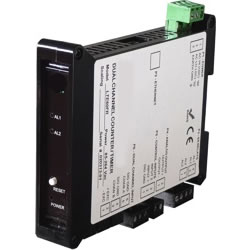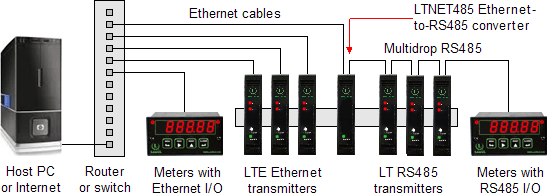
MLTE-FR | Ethernet & 4-20 mA Output | Frequency, Rate, Speed | DIN Rail Transmitter
The Micron Meters 4-20 mA transmitter for frequency, rate or period accepts two independently scalable input channels from a wide range of pulse sources, such as NPN or PNP proximity switches, contact closures, digital logic, magnetic pickups down to 12 mV, or AC voltages to 250 Vac. Input frequencies can range from 0.005 Hz to 1 MHz. Applications include AC line frequency, RPM or speed from proximity switch inputs, and flow from turbine flow meter inputs.
- With a Standard Main Board, the transmitter output can be scaled to track frequency in Hz, rate (such as gallons per minute), or period (inverse of frequency). Square root extraction is standard.
- With an Extended Main Board, the transmitter output can track rate or totalized rate (such as gallons) whether the transducer output is linear, requires square root extraction, or requires custom curve linearization. The latter can be provided by a curvilinear spline fit with up to 180 data points. The transmitter can also count up to a preset total or down from a preset total to zero. Such applications typically make use of optional dual solid state relays, which are available as options. External reset of totals is via a special three-position screw terminal connector. The two input channels A & B can also be combined arithmetically to provide an analog transmitter output that tracks A+B (e.g., sum of two flows), A-B (e.g., difference of two flows), AxB (e.g., horsepower as product of force and RPM), A/B (ratio of two flow), and A/B-1 (draw or relative elongation of material between rollers).

Exceptional Accuracy and Stability. Micron pulse input frequency and rate transmitters determine frequency by taking the inverse of period as measured with a calibrated quartz crystal time base. This results in extremely accurate and stable 6-digit internal readings (±999,999 counts), which are then processed in software. The analog output is generated by an ultra-linear 16-bit (65,536 step) digital-to-analog converter (DAC) for 0.02% output accuracy.
The update rate of the transmitter output is a programmed gate time + 30 ms + 0-2 signal periods. For a 60 Hz signal, the update rate would be 20 per second. Such fast update rates are ideal for alarm and control.
Standard features of Micron MLTE transmitters include:
- Ethernet I/O, isolated. Supported protocols are Modbus RTU and ASCII (tunneled via Modbus TCP) and Custom ASCII. The latter is simpler than the Modbus protocol and is recommended when all devices are Micron units. Note that RS232 or RS485 data I/O in lieu of Ethernet is provided by MLT Series transmitters.
- 4-20 mA, 0-20 mA or 0-10V analog transmitter output, isolated, jumper-selectable and user scalable. All selections provide 16-bit (0.0015%) resolution of output span and 0.02% output accuracy of a reading from -99,999 to +99,999 counts that is also transmitted digitally. Output isolation from signal and power grounds eliminates potential ground loop problems. The supply can drive 20 mA into a 500 ohm (or lower) load for 10V compliance, or 10V into a 5K ohm (or higher) load for 2 mA compliance.
- Dual solid state relays, isolated. Available for local alarm or control. Rated 120 mA at 130 Vac or 180 Vdc.
- Universal 85-264 Vac power. Low-voltage 10-48 Vdc or 12-32 Vac power is optional.
Discovery and configuration of the Ethernet Nodes is easily achieved with the Node Manager Software, and the discovered transmitters can then be programmed using the Instrument Setup Software. Both softwares run on a PC under MS Windows and can be downloaded from this website at no charge.

![]() MLTE-FR Frequency Rate, Speed Transmitter | Support Library
MLTE-FR Frequency Rate, Speed Transmitter | Support Library
Data Sheet | User Manual
